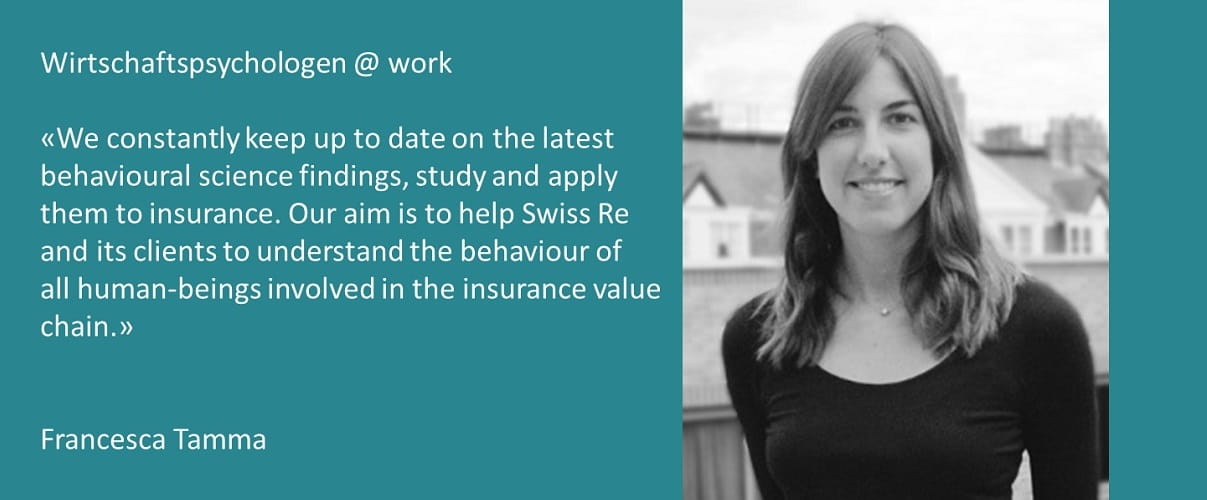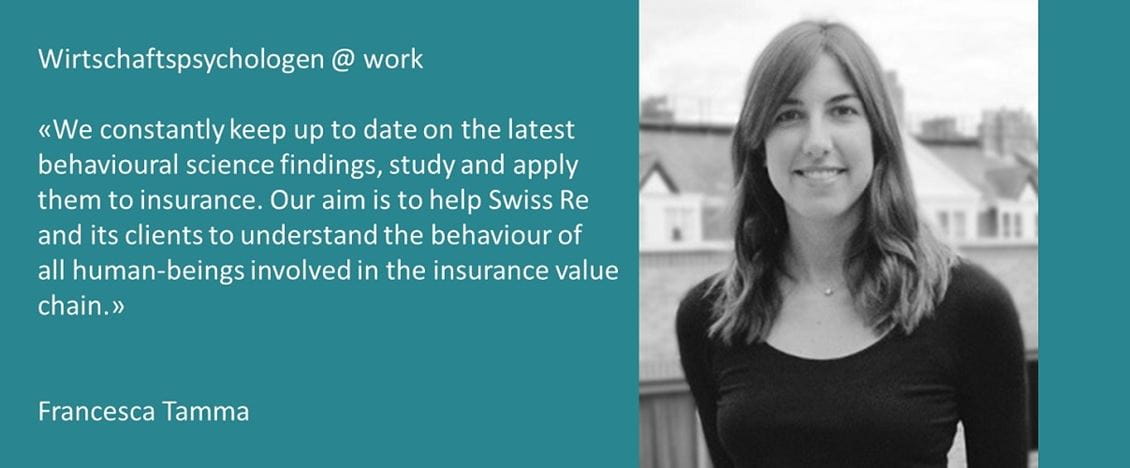Behavioural science @ Swiss Re
Sherin Keller, Prof. Dr. Jörn Basel
Die Verhaltensökonomie erlebt gerade Hochkonjunktur! Anders als in anderen Forschungsbereichen halten die verhaltensökonomischen Erkenntnisse aus der Akademia schnell Einzug in Wirtschaft und Politik. Lesen Sie dazu auch unseren Beitrag zum Behavioural Economics Guide 2018.
Wir wollten wissen, wie Unternehmen verhaltensökonomische Erkenntnisse ganz konkret einsetzen und was sie und ihre Kunden sich davon versprechen. Die Swiss Re, genauer gesagt Francesca Tamma, Behavioural Research Manager, hat uns einen Blick hinter die Kulissen gewährt.
Francesca, since when has Swiss Re been conducting behavioural research, and why?
Swiss Re started to build up a behavioural research unit in 2013. At that time, only two people, Alison McLean and Will Trump, worked part-time on this exploratory project. Today, we are a much larger team of behavioural researchers. We set up the unit to better understand policyholders and agents involved in the insurance value-chain. This knowledge is important, because as part of our reinsurance business we model behavior in terms of sales, retention, mortality assumptions and so on; and it is also valuable for our clients, primary insurers, who in turn better understand their policy-holders. This new focus on behavioural economics proved successful, as it could promptly deliver valuable and profitable results for our clients.
What exactly do you do with or for your customers? Can you give us an example of a study or behavioural economic intervention that you have carried out?
We carry out case studies with our clients and partners, the primary insurers, and since 2013 we've completed more than 100 trials. We recently worked with the claims team of a UK insurer. They told us that one of their pain-points is the slow turn-around for doctor reports. At the claims stage, quite often the insurer and also claimant have to wait up to 30 or 40 days for the doctor to respond to a request for medical information – before the insurer can make the pay-out. In the case of Terminal Illness claims, where the customer may have less than twelve months left to live, this delay is particularly frustrating. Speaking to doctors, we discovered that filling in these forms is not as high a priority as treating their patients – which is understandable. But we wondered if the way of communicating with doctors could make a difference. We hypothesized that a communication focussed either on the patient – by using a hand-written post-it note – or on the speed with which the best doctors return these forms could shorten response times. Over a six month period, we tested this in the real world, meaning that some doctors received the old form and some other doctors received one of the two new versions. After analysing the return times in each group, controlling for seasonality and historical data, we observed a significant increase in the speed of the doctors' turnaround time – through two small but decisive changes to the communication.
Do you see yourself as pioneers in the application of behavioural economics in insurance practice?
The attention to behavioural economics from the public sector, the private sector and universities that are changing their curricula has grown over the last five years. Nevertheless, when we started adopting behavioural evidence at Swiss Re, we were one of the first in our industry. Doing behavioural research means that we are not just writing blogs about existing literature but we carry out our own field experiments. We are still one of the early adopters today, which has earned us a lot of intellectual property in this area.
Is it possible to achieve big effects with behavioural economic interventions, or is it more a question of small behavioural adjustments?
Both are possible, but what drives the size of the impact is often the setting where you apply behavioural science: if you change a customer journey for a start-up company the effect will be much smaller than if you changed the journey for an existing Chinese insurer. However, a small-sized impact toward a difficult challenge like diabetes management could also be very important. And of course we also obtain null results, when –for example- the intervention designed using behavioural science is not effective, or the study design is not robust.
Do your customers sometimes have wrong expectations about the possibilities of behavioural economic interventions?
It depends on what you mean by wrong. Given we often work using a test and learn approach, it is rare that insurers will be able to predict accurately what the impact of a project will be. There is extensive evidence showing that behavioural researchers are also not very accurate at doing this themselves, which is why test and learn as an approach is important, and so are brainstorms and methodologies that strengthen view-point diversity. Moreover, our customers have very different expectations. Some are not yet familiar with behavioural economics and its possibilities – their expectations are correspondingly modest to the results that can be obtained. Others have already had experience with behavioural economic interventions or they have studied corresponding literature. Their expectations may be higher or at least more concrete. Seldom does anyone have highly unrealistic expectations of behavioural economic interventions.
Are you confronted with the accusation that behavioural economic interventions are manipulative and therefore unethical?
Ethics is a topic we carefully consider in each of our activities. We often discuss this with our academic partners, read the prolific literature on this topic, and as a team we operate using an ethical code. This is inspired by principles of distributional effects, transparency and truthfulness of the concepts we use in the design of behavioural interventions, and of course legal compliance.
Behavioural economics is a young, dynamic field of research. How do you keep your knowledge up-to-date?
Behavioural economics as a field of research is developing rapidly. To maximise the impact of our applied research, we want to be up to date with the latest scientific developments and therefore attend appropriate conferences, seminars, courses, discussion forums and so on. We are also a very skilled team, with experts who only recently left academia. Within our team, too, we actively exchange, share and discuss new findings and business models from start-ups in our field. For example, if someone reads an article or listens to a podcast, they summarise the key findings for the whole team. It helps that Will is a very fast reader so from one week to the next we can have a summary of a book and ideas on how to apply its contents to our work. We also have a network of academics, with whom we are in regular contact. And last but not least, we have tools that secure that the knowledge we created in past projects could be used for future projects.
What educational backgrounds do the team members have?
Disciplines and degrees differ. They range from economics, with a quantitative focus, to degrees in decision sciences and social or health psychology. And we also have insurance experts in our team who upskilled themselves in behavioural sciences. The insurance knowledge mainly comes from a close collaboration with other expert teams within Swiss Re like claims, underwriting or actuaries.
What literature would you recommend to people interested in behavioural economics applied to insurance context?
Recently, I really enjoyed the book Superforecasting by Philip Tetlock and others. It nicely illustrates how accuracy of experts’ judgments can be enhanced by designing an optimal environment within which experts make their judgements for example on teams or the ability to collect and share feedback. The first book I read on the topic during my undergraduate studies was The Armchair Economist by Steven E. Landsburg, which gives a number of examples of how everyday life around us can be interpreted through the lens of behavioural economics.
Do you have any career advice for a student pursuing a career with a focus on behavioural economics?
To give an overview of the demand for behavioural economists in the job market, consulting companies seem to recruit most and are therefore certainly interesting employers. Yet, there are other companies dealing with behavioural economics issues, analysing digital interactions with their customers, performing A/B testing and randomised studies. These companies will also hire experts with this knowledge. You would be surprised but it is not only the insurance sector, with its link to risk, uncertainty and other topical areas of behavioural research, but also the retail sector that would hire such experts! Public sector and policymaking have long led the way by deploying behavioural economics. Journalists as opinion leaders are currently very interested in this area. "Nudge units”, for example, is a popular keyword.
Und wenn Sie noch nicht genug haben von der Verhaltensökonomie – ja, vielleicht sogar erst so richtig Interesse dafür entwickeln – lesen Sie unsere weiteren Beiträge zum Thema. Zum Beispiel über die Replizierbarkeit von experimentellen Studien, Boosting, die Alternative zum Nudging, Richard Thaler, den aktuellen Nobelpreisträger in Wirtschaftswissenschaften oder über die Vorzüge von Geduld.
Weiterführende Informationen und Quellen:
Tetlock, P. & Gardner, D. (2015). Superforecasting: The Art and Science of Prediction. New York: Crown Publishers, Inc.
Landsburg, S. E. (2009). The Armchair Economist. London: Simon & Schuster UK Ltd.






